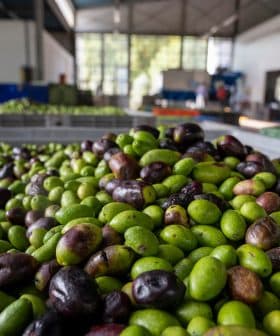Following MedDiet Fortified With Polyphenols Reduces Visceral Adiposity
A study published in BMC Medicine found that following a Mediterranean diet fortified with polyphenols can help reduce visceral adiposity, which is linked to various health issues. The research showed that the green-MedDiet, high in polyphenols from sources like green tea, walnuts, and Wolffia globosa, resulted in a significant reduction in visceral adipose tissue compared to other dietary groups.
An international team of researchers has found that following a Mediterranean diet fortified with polyphenols might play a pivotal role in mitigating the impacts of visceral adiposity, which is widespread among obese people.
Visceral obesity is a triggering factor for multiple pathologic conditions such as cardiovascular disease and metabolic syndrome. It is also associated with developing prostate, breast and colorectal tumors.
The traditional Mediterranean diet is a known source of polyphenols, which the researchers believe might impact adiposity.
See Also:Health NewsThe study, published in BMC Medicine, explored the impacts of what they defined as a “green-Med diet, twice fortified in dietary polyphenols and lower in red and processed meat.” The diet “may be a potent intervention to promote visceral adiposity regression,” the researchers wrote.
Over 18 months, the researchers followed 294 subjects with an average body mass index of 31.2 and an age of 51. Eighty-eight percent of them were men.
The subjects were divided into three groups. The first followed the healthy dietary guidelines, the second adhered to a traditional Mediterranean diet, and the third followed a green-MedDiet. All three groups were equally calorie-restricted.
The subjects were also asked to exercise and consume 28 grams of walnuts daily, adding 440 milligrams of polyphenols to their diets.
The green-Med group was also asked to consume three to four cups of green tea daily, and a 100-gram Wolffia globosa shake.
“The green protein shake was partially substituted for dinner, replacing beef or poultry protein source,” the researchers wrote. Wolffia globosa is an aquatic plant high in protein, fiber and fat.
See Also:Med Diet Adherence Linked with Lower Intestinal Inflammation, Study FindsDuring the observational period, the researchers used magnetic resonance imaging to measure the abdominal adipose tissues, which demonstrated that visceral adiposity tissue was reduced by 4.2 percent in the healthy dietary guidelines group, 6 percent in the MedDiet group and 14 percent in the group following the green-MedDiet.
Weight loss and waist circumference decreased by 4.7 percent in the MedDiet group and 5.7 percent in the green-Med group.
According to the researchers, higher green tea, walnut, and Wolffia globosa consumption paired with lower red meat intake resulted in higher total plasma polyphenols and elevated urine polyphenols. These were significantly associated with a more significant loss of visceral adipose tissue.
Researchers explained that the Mediterranean diet is a reference point for the study as it includes plenty of foods rich in polyphenols. The eating pattern has been shown to reduce visceral adiposity regardless of weight loss when associated with physical activity.
In the MedDiet, polyphenols come from extra virgin olive oil, vegetables, fruits, legumes, nuts, red wine and whole-grain cereals. Current research shows that extra virgin olive oil comprises at least two dozen polyphenols, the health benefits of which continue to be researched.
To date, following the MedDiet has been shown to reduce inflammation and oxidative stress, enhance endothelial function, increase plasma concentrations of the beneficial adiponectin hormone and curtail the atherogenic lipoproteins, which are linked to cardiovascular disease.









